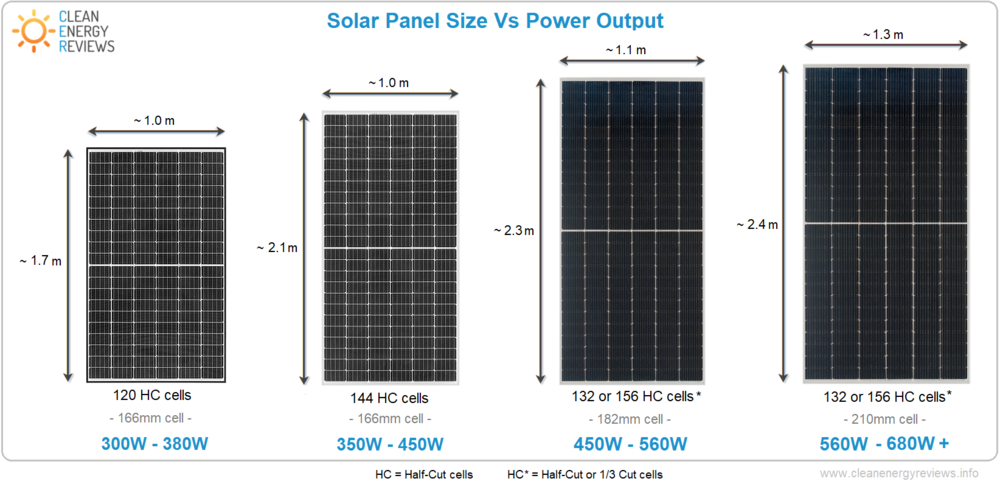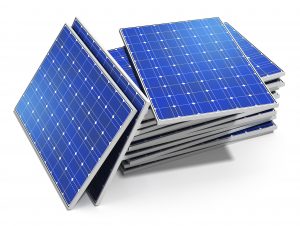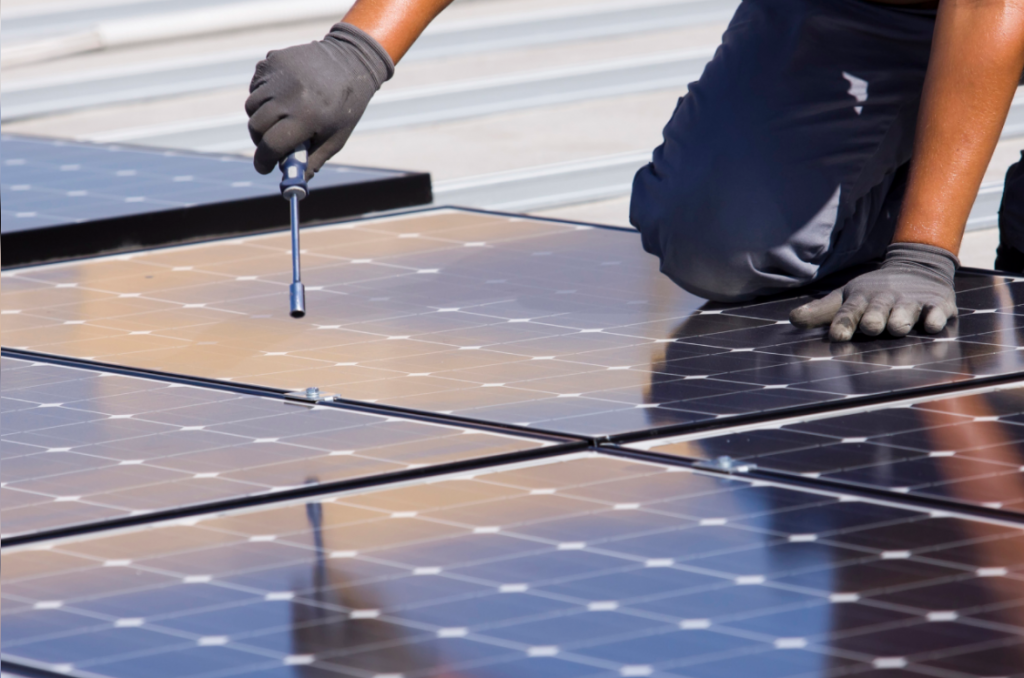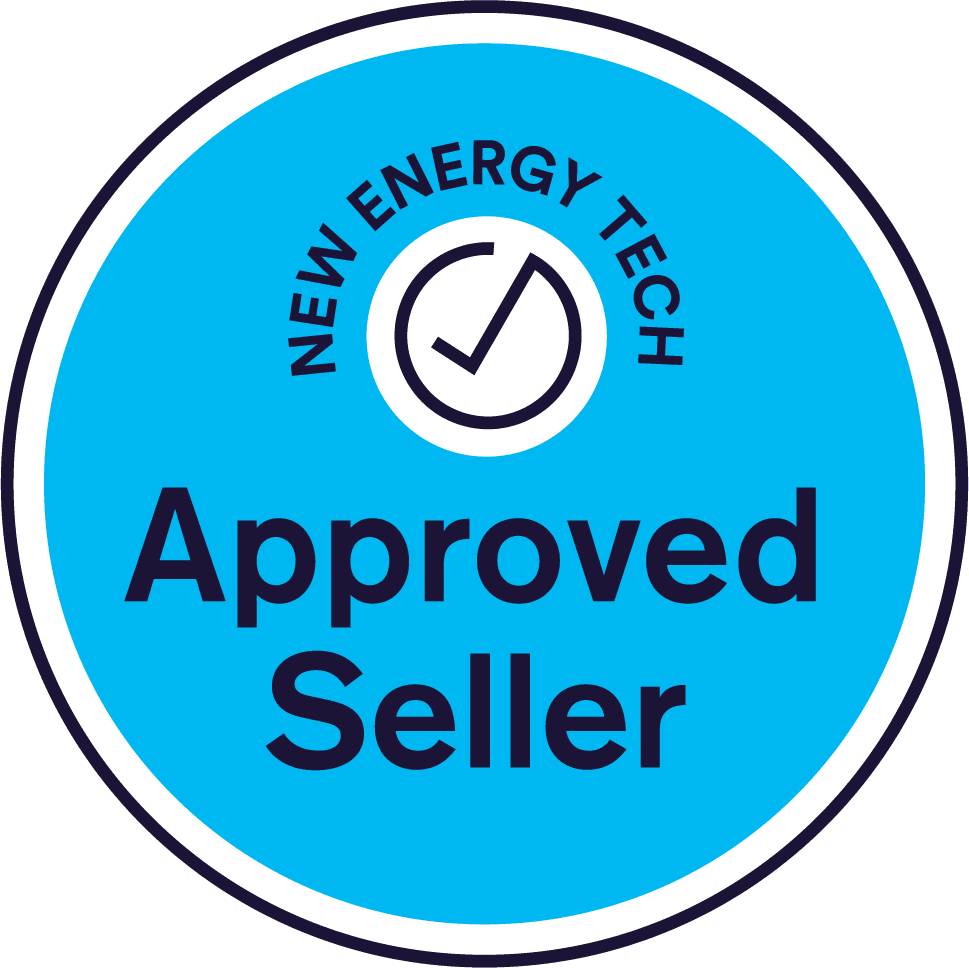10 things to consider before buying solar panels
1- Who is the manufacturer?
As you can imagine, in the last 10 years as the solar industry has boomed, there’s been a huge amount of different manufacturers from all across the world pop up, and lots of them have disappeared. In fact, if you go back around seven years, and look at the Clean Energy Council list of accredited solar panel manufacturers here in Australia, and compare it to today, you’ll find that 83% of them are no longer in business or no longer serving the Australian market. What that means is that a lot of solar panels out there unfortunately no longer have warranties and are starting to fail rapidly.
So have a look at who the manufacturer is, check out how long they’ve been trading for, have a look at how diversified they are. We prefer solar panel manufacturers that don’t just make solar panels, and that have lots of different revenue streams, which common sense would suggest would mean that they’re going to be around a lot longer to help out with warranties, even if the solar industry is no longer performing in the same way it is today.
So have a look at the manufacturer, have a look at their trading history, make sure you’re comfortable that they’re established enough organisation that’s going to be there with you in the long term.
2- How long has that manufacturer been selling solar panels into the Australian market?
Once you’ve identified a strong manufacturer that you’re comfortable with, it’s a good idea to check out how long they’ve been here for. Do they have an established office here in Australia? And what is that support going to be like, if you really need it? It’s no good having a massive fortune 500 company manufacturing solar panels, if they’ve only been selling into Australia for a year. If they’re offering 25 year warranties, let’s say they decide to exit the Australian market in three or four years. Are you really going to be that well supported here in Australia? Or are you going to be trying to contact people overseas to get warranties looked after?
That leads us to number three…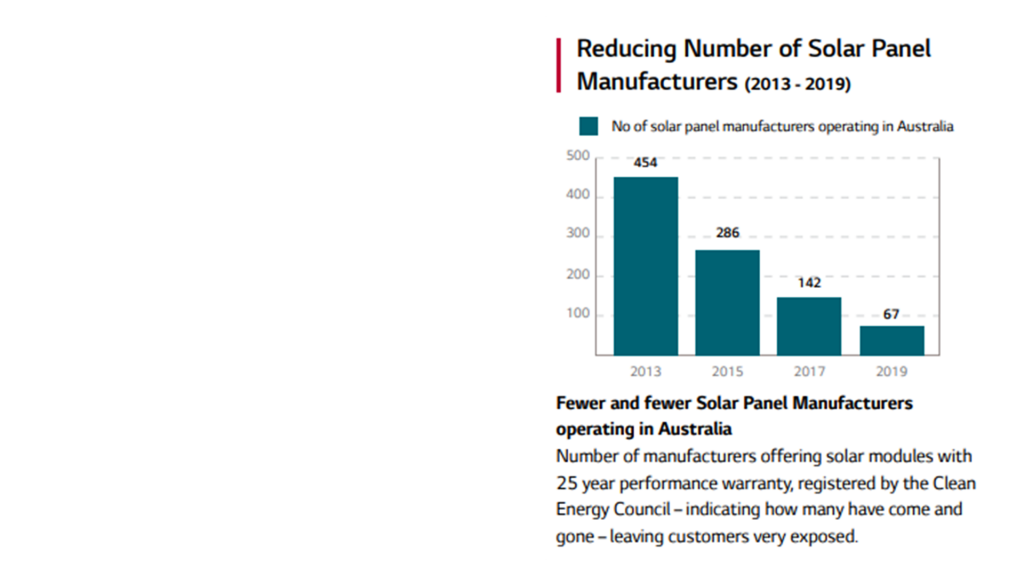
3- What is the warranty?
And is it actually going to be honoured when you look at solar panel manufacturers and the warranties they’re offering. The minimum performance warranty you’re going to see is 25 years, some are offering 30 years performance. There’s also a product warranty, which covers the whole product itself, which is the more important warranty. They’re always a minimum of 10 years, some are 12. And in fact, a lot are now offering 25 and even some are offering 30 year product warranties. That’s a long time, you really need to question how many of those manufacturers have the intent and the ability to honour those warranties in such a long period of time. So check out the warranty and check out its credibility. Unfortunately, as mentioned before, a lot of solar panel manufacturers across the world have either gone out of business or exited from the Australian marketplace. A lot of those have been writing 25 and 30 year warranties, which now unfortunately for the people that have purchased those panels, those warranties are not worth the paper that they’re written on.
4- What is going to fit on your roof?
Solar panels are all slightly different dimensions these days. And they also have slightly different power classes, which means that the amount of energy a panel can produce is slightly different. Depending on the brand that you choose, you’ll notice that you might have a 450 watt panel with one brand and a 370 watt panel with another brand. That doesn’t necessarily mean that the 450 watt panel is going to be a better fit for your roof. And you’re going to be able to fit less of them on the roof. Because typically, a bigger panel in terms of the wattage is also going to be a bigger panel in terms of the physical dimensions of the panel. So don’t be fooled by a really high power class panel. And don’t think that it’s necessarily a much more efficient panel: it could just be that it’s physically bigger. So the power costs of the panel is going to be important, but be aware of the physical dimensions of the panel and make sure that you choose one that’s going to fit on your roof, especially for homeowners with tight roof areas. Some of those newer, larger panels are just simply not going to fit on your roof into the screw lines of the roof, or fit side by side on a roof with enough space to meet current standards for installs.
5- Consider the efficiency of the solar panel
This links in with number four. As I mentioned, you could have a 450 watt panel with a lower efficiency rating than a 370 watt panel. Basically, the efficiency rating of a panel is wattage divided by metres squared, and simply means how much energy can that panel produce within the space that it uses up on your roof. If you want a really high efficiency panel, meaning it’s going to take up less room on your roof, you’re going to pay a little bit more for it, you may or may not need that depending on your roof area. So once you’ve checked out your roof and what’s available, the efficiency of the solar panel may or may not be that important to you. It’s certainly not as big a selling point as what some manufacturers and some retailers make it out to be. If you have the roof space available, you will not necessarily need a really, really high efficiency panel. And if you have the roof area available, a 10 kilowatt system with a panel efficiency of 20% doesn’t mean it’s going to produce more than a 10 kilowatt system with a panel efficiency of 19%. It just means that this one with a slightly lower efficiency rating is going to take up a little bit more room on your roof. For more information on the efficiency of solar panels, click here.
6- Gather technical data and reviews
If you’re really interested in all the technical Data, grab some data sheets from our website, or from another resource and check those out. However, looking at the reviews is something that’s a lot more easier for you to do. So have a look at the reviews and have a look at the source of those reviews. Unfortunately, in Australia, there’s lots of solar experts around who’ve posted reviews or opinions on certain solar panels that frankly, are either biassed to suit their outcomes, or a come from people that really aren’t credible or experienced enough to be offering those opinions. So reviews are important. But checking the source of the reviews are equally as important! So make sure that the information you’re reading is actually credible. At GI Energy we can install any solar panel for your home or business. This means we are able to write honest reviews expressing our genuine opinion, without having to be biased due to holding stock of any particular solar panels! This article details the opinion of our Business Development Director, who has worked in various roles from consultancy, business development and commercial project management in the PV industry since 2009.
7- Price
Of course price is always important. As I mentioned before, if you want a really high efficiency solar panel, you’re going to pay a bit more for it. If you want a panel from a really, really good brand with a really diversified backing, then you’re going to pay a bit more for it. That being said, if you go and choose a solar panel purely based on price, and you look for the cheapest solar panel out there, you’re almost certainly going to regret it. The fact is, solar panel manufacturers that are just purely trying to drive down costs and offer the cheapest panel out there are always going to have to cut corners to get there. Often their warranties won’t be as credible as the more established brands. And unfortunately, that’s why we have that horrible statistic of 83% of solar panel manufacturers from seven years ago, no longer being here in Australia to support warranties. So while we understand that budget is always a consideration, you definitely don’t need to buy the most expensive solar panel on the market. In fact, it’s pretty rare that we install the most expensive brands, but finding that sweet spot between price and quality, and being sure that the warranties are actually going to be honoured is really, really important.
8- Where is the solar panel made?
Now depending on your personal preferences, this may be more or less important to you. The simple fact is the vast majority of solar panels are now made in China. But you can purchase panels from Singapore, you can purchase panels that are manufactured in America, you can purchase solar panels that are manufactured in Korea. And there is actually a brand of solar panels manufactured here in Australia too. However, the Chinese panels do still own the majority of the market and that isn’t necessarily a bad thing. You can buy some really, really good quality brands from China. And of course, you can buy some really cheap and nasty ones.
So follow the tips throughout this article to make sure that whichever panel manufacturer you are purchasing from is credible, is going to honour warranties. And make sure that the panel’s get the right reviews, and have the right technical data. If you don’t want to buy a Chinese brand, there are other options out there for you. So have a look where it’s made. Don’t be fooled by some of the names of solar panels without mentioning them specifically, there are some out there that will call themselves a brand name that alludes to the fact that they’re made in Germany, for example, whereas in the real world, they’re actually not: they’re a Chinese brand. So just have a real good look into it and make sure that you’re buying what you think you are.
9- Make sure that the solar panel that you’re installing is on the Clean Energy Council list of accredited solar panels.
Here in Australia, for solar systems installed that go from zero up to 100 kilowatts in size, you’ll be able to claim what’s called Small scale Technology Certificate or STC. However, the solar panel that you install needs to be on that list of accredited solar panels in order for you to be able to claim those STCs. The STCs represent a value of between $2,000 up to about $45,000 depending on the size of the system. The solar company that you’re talking to should be doing this for you and they should only be offering solar panels that are on that list. However, over the last decade, we have seen on numerous occasions solar panel manufacturers that have allowed their panels to fall from that list, but have then still been installed! And people have had issues with STCs trying to be reclaimed, which is worries for customers that really shouldn’t happen. So ask your solar retailer to show you that they’re on that list of clean energy council accredited solar panels so that you know with confidence that you’re not going to have any issues in the future with STCs trying to be reclaimed.
10- Who is going to install those solar panels?
It’s all very well, doing your research, finding the perfect fit for your roof, allowing for the right budget and the right solar panel for you. But if somebody is going to come along and do a poor job of your installation, then all of that good work goes out the window! There is no point in having a solar system installed with the best solar panel in the world and the worst workmanship, the two have to go hand in hand. So do your research on the people that are going to install that system for you and make sure that they’re installing it properly. You can do so by making sure that they have a good track record and they’re going to be there to help you out if you ever need anything in the future.
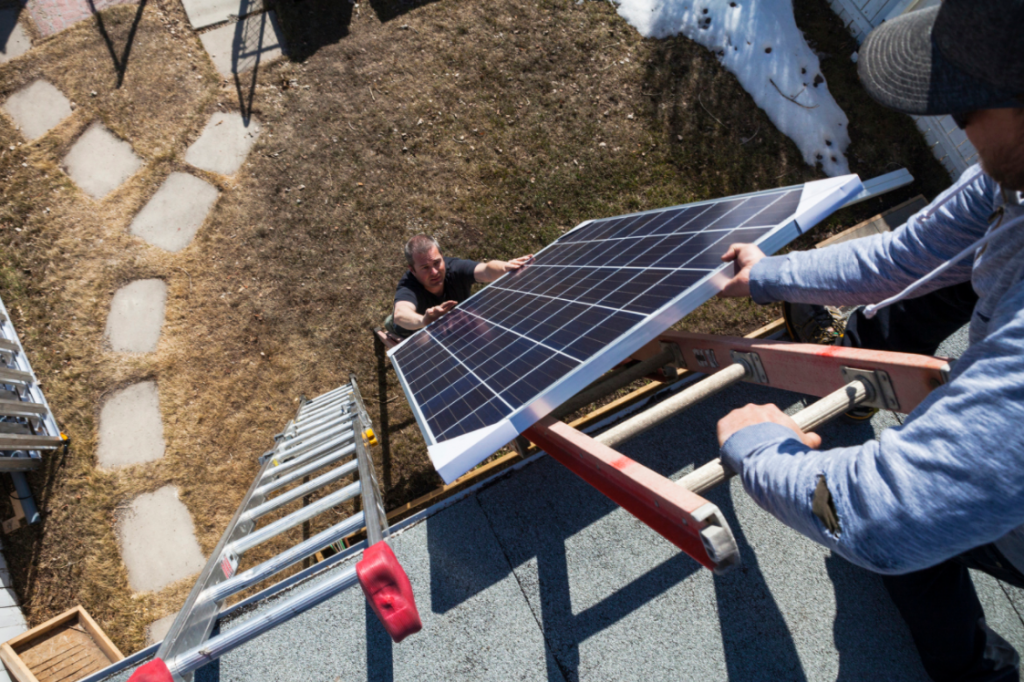
Here are some links worth checking out:

